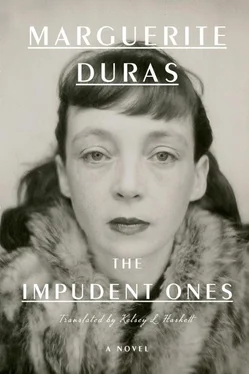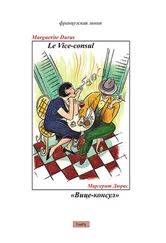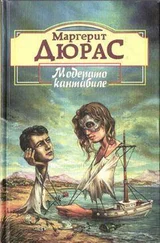Marguerite Duras
THE IMPUDENT ONES
A NOVEL
TRANSLATED FROM THE FRENCH BY
KELSEY L. HASKETT
To my brother,
Jacques D.,
whom I never knew
This note is intended to provide additional clarity to the family relationships described in the novel, as well as to its setting. The Grant-Taneran family is composed first of all of Mrs. Grant-Taneran, previously a widow with the married name of Grant, who brought two children into her second marriage, Jacques Grant and Maud Grant. When Mrs. Grant married Mr. Taneran, they had another son, Henry Taneran. All together they constitute the Grant-Taneran family, more frequently known as the Taneran family. As well, Mrs. Grant-Taneran is often referred to simply as Mrs. Taneran, and her first two children simply as Maud or Jacques Grant.
The novel begins in the family’s apartment in the Parisian suburb of Clamart, with Maud looking out the window toward another Parisian suburb named Sèvres. The story soon moves to the area around Uderan, the family estate situated in southwest France, and returns near the end to Clamart. One final change in location takes place, to complete the novel.
MAUD OPENED THE WINDOW AND THE DISTANT SOUNDS OF the valley filled the room. The sun was setting. It left in its wake massive clouds that clustered together and rushed blindly toward a chasm of light. The seventh floor, where they were living, seemed breathtakingly high. The view around them revealed a deep and resonant landscape that stretched right out to the somber streak of the hills of Sèvres. Between this distant horizon crammed with factories and suburbs and the apartment high in the open sky, the air, brimming with a fine mist, appeared thick and murky, like water.
Maud stayed by the window for a minute, her arms stretched out on the balcony railing and her head tilted to the side in the pose of an idle child. But her face was pale and etched with boredom. When she turned back toward the bedroom and closed the window, the humming of the valley suddenly stopped, as if she had closed the sluice gate of a river.
At the far end of the dining room stood the buffet. It was a very ordinary piece of furniture from the period of Henry II, but with time it had taken on the role of a silent character in the Grant-Taneran home. It had followed the family and they had eaten their meals off its chipped dishes for more than twenty years. Its style and the disorder that reigned in its shelves revealed a strange absence of taste. It was obvious to anyone who saw the buffet that the Grant-Tanerans never chose or bought furniture but made do with average-looking, more or less suitable pieces of furniture that had haphazardly been passed down to them through various inheritances.
Thus it was that they gathered around the Henry II–style buffet on the evenings they arrived home from their trips. And those evenings were always the most trying because they realized that they hadn’t yet left each other and that their old sideboard continued to observe them like the image of their despair.
Tonight on the buffet, the statement addressed to Jacques Grant from the Tavares Bank lay waiting for someone to open it. These statements regarding his debts often came at a bad time. This was an especially bad day because Jacques had just lost his wife, Muriel. She had died that very day following a car accident. Jacques was weeping in his bedroom, abandoned by his family, for it concerned Muriel, whom they knew very little, and each one possessed, besides their personal reasons for not reaching out to him, a reason common to all the Grant-Tanerans, a kind of contemptuous mistrust with regard to his expression of pain. So Maud didn’t go in to see Jacques, even with the excuse of the statement from the bank. Moreover, it seemed to her that the statement’s arrival wasn’t entirely bad timing; it bitterly highlighted the fateful character of this tragic and lethargic day.
In the dining room, things like her brother’s overcoat, scarf, and hat lay around in disorder, thrown over chairs. These finer objects always surprised Maud, because they were so different from her own things.
From the dining room doorway and down the dark, bare hallway came the sound of Jacques’s sobbing. Maud listened attentively, her tall frame leaning against the window and her face alert. She was attractive in this pose and her beauty emanated from her face like untamed shadows. Her pale, overly wide forehead made her gray eyes look even darker. Her face, with its skin stretched out over her prominent cheekbones, was attentively immobile.
Maud felt nothing except her heart, which was beating heavily. An irresistible disgust churned inside her, but her body held it in well, like the solid banks of a torrential stream. She listened to her brother’s sobs, this elder brother who at forty was twenty years her senior, weeping like a child. He had married Muriel barely a year ago, and this marriage constituted the most important event of his life, for he had never accomplished anything else. Since attaining his majority twenty years ago, he claimed jokingly that he had been content to put up with his family.
Mrs. Grant-Taneran readily accepted the idle and dangerous life her son led but, on the other hand, had never forgiven him for marrying a woman from the world he frequented. Although their quarrels were once quickly resolved, with Mrs. Taneran revealing her influence over him each time by calming down almost magically in the face of her son’s growing indignation, this was no longer the case.
Maud sensed their mother’s presence, alone, in the depths of the apartment, entrenched in the kitchen, her last place of refuge. There was no sound coming from the kitchen, but Maud knew the noise of the sobbing cut through Mrs. Taneran’s apparent silence. And considering the time this ordeal had lasted, since three o’clock in the afternoon (and it was already eight o’clock in the evening), the devastating effects of the sobbing must have been considerable.
The doorbell rang. The young woman went to open it. Her half brother, Henry, poked his head in with a childlike movement, barely showing his angular face and brown hair and looking like the spitting image of his father, Mr. Taneran. From Maud’s low voice and the uncustomary calm that reigned, he guessed what was happening. “So it’s over? Leave them alone and come with me. Let’s get out of here.” Maud refused. She turned on a small lamp beside her and waited.
Shortly afterward, with the sound of a grating key, Mr. Taneran emerged from the shadows of the apartment hallway. He had a short mustache, a bit charred-looking, with despondent eyes set in a face carved with wrinkles as pronounced as scars. He was thin and rather stooped.
At one time Taneran had had a respectable career teaching natural sciences at the high school in Auch. Upon retirement, he had married Mrs. Grant, who was living in the city where her first husband had worked as a tax collector.
Taneran was just returning from the Ministry of Education, where, at over sixty years of age, he had been obliged to take up work again in order to meet the heavy demands that, since his marriage, had completely absorbed his personal fortune.
In reality, his family had easily adapted to his sacrifice. It should be added that since he had started working again, Taneran had managed to escape a little from the tyranny of his family and felt quite pleased about it. He had never become used to the inevitable constraints of family life and lived, moreover, in constant fear of his stepson, Jacques Grant. If he had not hesitated to marry Mrs. Grant even though she already had two children, it was because he had assumed that the older one would soon be getting along on his own.
Читать дальше









